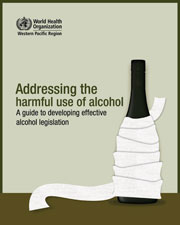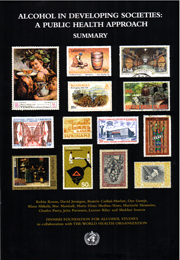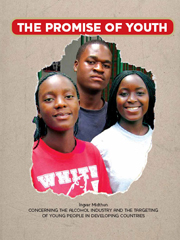
Alcohol nourishes gender-based violence in Rwanda
Every third man who has been drinking alcohol beats his partner according to a study in Rwanda from 2010. The cultural norm constituted in a society like Rwanda is that the man decides, men dominate. It is a characteristic for many countries in Africa where women's rights remain subordinate to those of their husbands.
The report Masculinity and Gender Based Violence in Rwanda paints a rather grim picture, based on experiences and perceptions from interviews with more than 3.600 men and women in the age 18-60 years. The study from Rwanda also describes how the use of alcohol drugs nourishes the problem of gender-based violence. The report has been commissioned by The Rwanda MenEngage Network.
Click here to download the full report.
In Rwanda, the existing perception of a man is that he should be tough, that he needs more sex than women and is always ready for sex. The standards of dominance that go along with man and manhood are reinforced by religion, Christianity, which has a strong presence in people's lives. It is a common notion that the Bible gives him the right to dominate his wife and his family.
“It is concluded that VAW (violence against women) in partner relations is based on deeply ingrained perceptions in society about gender inequality. Although women agree with their submissive role, they consider the beatings and forced sex as harmful violent acts. Men seem to be less aware of the harm and injustice of their acts and justify their behavior with their male family role. The self-perceptions of men are associated strongly with power and control over women”.
(p 37, Masculinity and Gender Based Violence in Rwanda)
“In all focus group discussions, similar statements were heard that were used to justify gender inequality and explain gender roles as made by nature and God, and not socially constructed in society. Thus, the gender roles taught by churches and/or socio-cultural practices play an important role in construction of masculinity perceptions.”
(p 49, Masculinity and Gender Based Violence in Rwanda)
In a strongly masculine norms system the occurence of alcohol exacerbates oppression of women. Especially since alcohol is included in the construction of a dominant, power exerting and often violent male role. The study Masculinity and Gender-based violence in Rwanda: Experiences and Perceptions of Men and Women (2010) show that more than one in three men who drink beats his partner, while less than one in five who do not drink, does it.
“More than half of all males consume alcohol, especially in the age group above 35 years old (70%), but only 16.7% say they drink more than three times a week. The comparative analysis indicated that consumption of alcohol is correlated with violent behavior of men towards women”.
(p 49, Masculinity and Gender Based Violence in Rwanda)
In the Country Assessment on Violence Against Women (2008) alcoholism is the factor which recurringly is mentioned in various kinds of violence, beatings, rapes, etc. in Rwanda. The study is one of ten country studies initiated by UN Secretary General (A/61/122/Add.1, and Cor.1) to form the basis for the decision to eliminate violence against women at all levels and by violence is understood physical, mental, economical and emotional violence.
“Domestic violence: incidences of this form of violence are high in Kigali City, though domestic violence was found to be a lived reality across the country. Again women are the majority of the victims with their husbands being the perpetrators. Causes are believed to be linked with alcoholism, poverty, ignorance, and some cultural norms and practices.”
(p 15, Country Assessment on Violence against Women)
Click here to download the full report.
The goal of eradicating violence against women in Africa is a huge challenge as strongly patriarchal structures and norms prevail. The gender inequality is the root cause. Alcohol however contributes significantly to impede development, maintain and exacerbate the trend. It retains men and women in violent relationships. Alcohol industry efforts to develop and exploit markets like Rwanda and other developing countries hamper the work further.
A reason for concern in this context is the poor awareness and/or the unwillingness among development cooperation NGOs to see opportunities to reduce GBV by supporting local opinions for reduced drinking and to promote evidence and public health based alcohol policies in Rwanda and other countries.
Sources:
- Masculinity and Gender-based violence in Rwanda: Experiences and Perceptions of Men and Women; RWAMREC, MenEngage, ICRW, UNDP (2010)
- Country Assessment on Violence Against Women; UN Rwanda, UNFPA (2008)
Text: Per-Åke Andersson
![]()
![]()
Developed with CustomPublish CMS by Nettinfo AS




